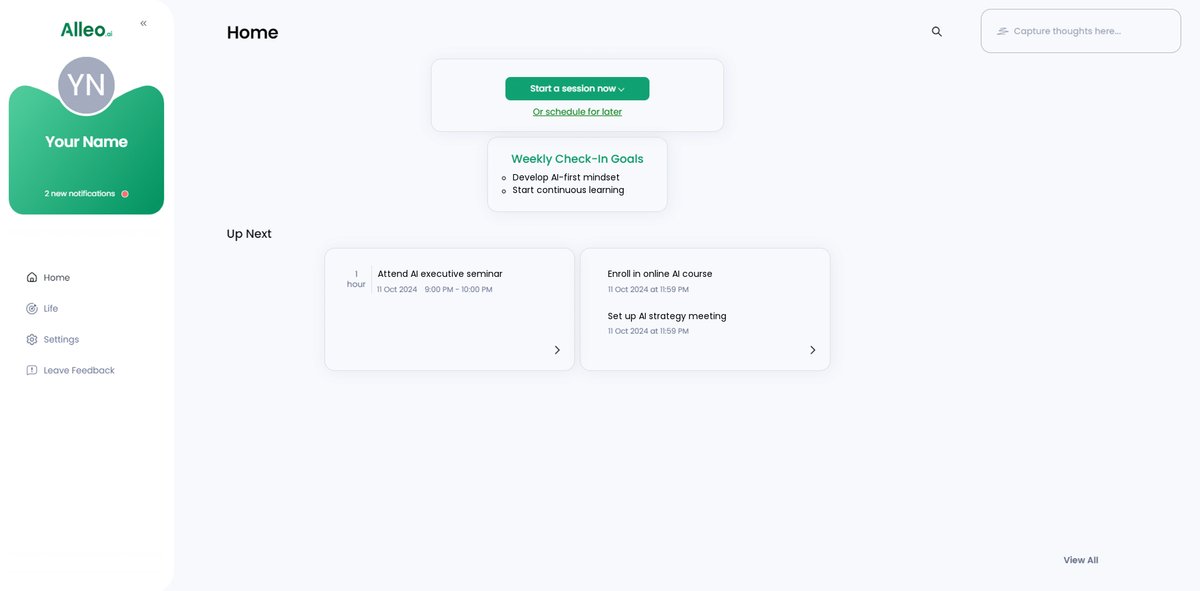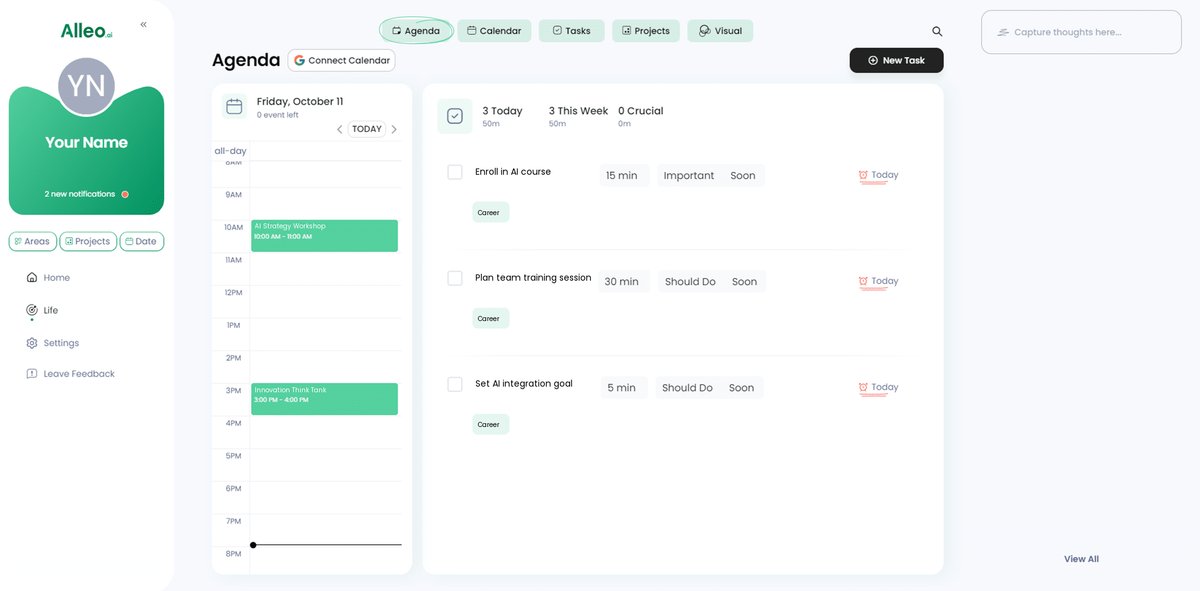The Ultimate Guide for Executives: 7 Strategies to Stay Relevant in the Age of AI
Are you feeling overwhelmed by the rapid advancements in AI and questioning your ability to keep up? As an executive, you may be seeking AI strategies to navigate this changing landscape.
As a life coach, I’ve helped many professionals navigate these challenges. In my experience, it’s common for executives to feel a sense of inadequacy and imposter syndrome due to these fast-paced changes. Executive upskilling in artificial intelligence is becoming increasingly crucial for leadership adaptation to AI technologies.
In this blog, you’ll learn actionable AI strategies for executives to stay relevant in the age of AI. We’ll cover developing an AI-first mindset, continuous learning, and fostering innovation. These insights will help with AI integration in business strategy and future-proofing executive skills.
Let’s dive in to explore how AI-driven decision making can transform your leadership approach.

Why Executives Feel Overwhelmed by AI Advancements
The rapid pace of AI and technological advancements can be daunting. Many executives feel they can’t keep up with the constant evolution of AI strategies for executives.
This often leads to feelings of inadequacy. In my experience, executives frequently struggle with imposter syndrome when it comes to AI-driven decision making.
The stakes are high. Failing to adapt to AI technologies can mean being left behind in leadership adaptation.
Several clients report feeling overwhelmed by the need to stay relevant in AI integration in business strategy. The pressure is intense.
You might feel this way too. It’s a common issue among corporate leaders striving for AI literacy.
But there are ways to overcome these challenges in balancing human insight with AI capabilities. Let’s explore them.

Roadmap to Staying Relevant in the Age of AI
Overcoming this challenge requires a few key steps. Here are the main areas to focus on to make progress in implementing AI strategies for executives:
- Develop an AI-first mindset and strategy: Attend AI-focused seminars and collaborate with experts to enhance AI literacy for C-suite leaders.
- Prioritize continuous learning and upskilling: Enroll in online courses and keep your team trained, focusing on executive upskilling in artificial intelligence.
- Foster a culture of innovation and adaptability: Encourage experimentation and reward innovative ideas, promoting leadership adaptation to AI technologies.
- Enhance emotional intelligence and soft skills: Improve empathy through leadership coaching and team-building activities, balancing human insight with AI capabilities.
- Leverage AI tools to augment decision-making: Use AI-driven analytics and project management software for AI-driven decision making.
- Focus on human-centric leadership qualities: Prioritize employee well-being and transparent communication while considering AI ethics and governance for executives.
- Build cross-functional collaboration skills: Facilitate workshops and mentorship programs to enhance collaboration, promoting collaborative AI in executive roles.
Let’s dive in to explore these AI strategies for executives and their impact on AI integration in business strategy!
1: Develop an AI-first mindset and strategy
Developing an AI-first mindset is crucial for staying relevant in today’s fast-paced business environment. Executives must embrace AI strategies to drive innovation and maintain a competitive edge.
Actionable Steps:
- Attend AI-focused executive seminars and workshops: These events provide a foundational understanding of AI, helping you stay informed about the latest trends and enhance AI literacy for C-suite leaders.
- Collaborate with AI experts: Work with specialists to create a strategic AI roadmap for your organization, ensuring alignment with your business goals and promoting AI integration in business strategy.
- Set measurable goals for AI integration: Define clear, achievable targets for incorporating AI into your business processes, and track your progress to support AI-driven decision making.
Explanation:
These steps matter because they enable you to stay ahead of technological advancements and make informed decisions, supporting leadership adaptation to AI technologies.
Attending seminars and workshops helps you understand AI’s potential and limitations. Collaborating with experts ensures that your AI strategy is well-thought-out and aligned with your business goals, promoting future-proofing executive skills.
Setting measurable goals helps you track progress and make adjustments as needed. According to Georgetown University, AI strategy and innovation management are critical for aligning AI projects with company goals.
Key benefits of developing an AI-first mindset:
- Enhanced competitive advantage
- Improved decision-making processes
- Increased operational efficiency
Embrace these AI strategies for executives to position yourself as a forward-thinking leader in the age of AI, balancing human insight with AI capabilities.

2: Prioritize continuous learning and upskilling
Prioritizing continuous learning and upskilling is essential for staying relevant in the AI-driven business landscape, making it a crucial AI strategy for executives.
Actionable Steps:
- Enroll in online courses focused on AI and emerging technologies: These courses keep you updated on the latest advancements, ensuring you have the necessary skills for AI-driven decision making.
- Schedule regular team training sessions: This guarantees that your workforce is also upskilled, fostering a knowledgeable and capable team ready for AI integration in business strategy.
- Join professional networks and forums: Staying connected with industry leaders and peers helps you stay informed about AI trends and best practices, enhancing your AI literacy as a C-suite leader.
Explanation:
These steps are crucial because they ensure that both you and your team are well-prepared for the evolving technological landscape. Online courses provide you with the latest knowledge, while team training sessions ensure collective growth, supporting leadership adaptation to AI technologies.
Joining professional networks keeps you connected and informed, helping you balance human insight with AI capabilities. According to IBM, companies need to create a lasting strategy for AI upskilling, communicate clearly, and invest in learning and development.
Continuous learning is key to staying ahead and future-proofing executive skills in the era of AI.

3: Foster a culture of innovation and adaptability
Creating a culture of innovation and adaptability is essential for staying ahead in today’s AI-driven business landscape and implementing effective AI strategies for executives.
Actionable Steps:
- Encourage a mindset of experimentation: Allow your team to experiment with new ideas, fostering a safe space for trial and error in AI integration in business strategy.
- Implement a system for recognizing and rewarding innovative ideas: Regularly celebrate and reward employees who contribute creative solutions, promoting AI-driven decision making.
- Create cross-functional teams for AI-driven projects: Facilitate collaboration between departments to bring diverse perspectives to AI initiatives, enhancing collaborative AI in executive roles.
Explanation:
These steps are crucial because they promote a dynamic and forward-thinking work environment. Encouraging experimentation helps uncover new opportunities and solutions, supporting executive upskilling in artificial intelligence.
Recognizing innovative ideas motivates employees to think creatively. Cross-functional teams bring varied expertise, enhancing project outcomes and supporting leadership adaptation to AI technologies.
According to Ignite HCM, fostering innovation and collaboration is key to navigating the AI landscape effectively.
This approach ensures your organization remains agile and ready to embrace change, future-proofing executive skills in the era of AI strategies for executives.
4: Enhance emotional intelligence and soft skills
Enhancing emotional intelligence and soft skills is vital for thriving in an AI-driven business environment, especially when implementing AI strategies for executives.
Actionable Steps:
- Participate in leadership coaching sessions: Improve empathy and communication through targeted coaching, focusing on AI literacy for C-suite leaders.
- Practice mindfulness and active listening techniques: Use these methods to better understand team dynamics and foster stronger relationships, essential for balancing human insight with AI capabilities.
- Organize team-building activities: Strengthen interpersonal relationships and enhance team cohesion through regular activities, promoting collaborative AI in executive roles.
Explanation:
These steps matter because strong emotional intelligence and soft skills are critical in the AI age. Leadership coaching can enhance your ability to connect with your team, while mindfulness and active listening improve overall team dynamics, supporting AI-driven decision making.
Team-building activities foster a collaborative environment. According to Forbes, empathy and adaptability are crucial leadership skills in the changing AI landscape, essential for AI integration in business strategy.
Essential soft skills for the AI era:
- Effective communication
- Emotional intelligence
- Adaptability and resilience
This approach ensures you lead with a human touch while embracing AI advancements, contributing to future-proofing executive skills and addressing AI ethics and governance for executives.

5: Leverage AI tools to augment decision-making
Leveraging AI tools can significantly enhance decision-making processes in your organization, making it a crucial AI strategy for executives.
Actionable Steps:
- Utilize AI-driven analytics tools: These tools provide data-driven insights to help you make informed decisions quickly, supporting AI-driven decision making.
- Implement AI-based project management software: Streamline operations and keep track of project progress efficiently with AI tools, facilitating AI integration in business strategy.
- Regularly review AI-generated reports: Identify areas for improvement by analyzing insights from AI-generated data, contributing to executive upskilling in artificial intelligence.
Explanation:
These steps matter because AI tools can transform how you manage information and make decisions. AI-driven analytics offer precise insights, while AI-based project management software enhances operational efficiency, demonstrating leadership adaptation to AI technologies.
Regular reviews of AI-generated reports help you stay ahead of potential issues. According to AuditBoard, integrating AI within risk management can revolutionize decision-making and operational efficiency, highlighting the importance of AI literacy for C-suite leaders.
Embracing these tools ensures you stay competitive and future-proof your executive skills.
This approach helps you leverage AI effectively in decision-making processes, balancing human insight with AI capabilities.

6: Focus on human-centric leadership qualities
Focusing on human-centric leadership qualities is crucial for staying relevant and effective in an AI-driven world, making it a key component of AI strategies for executives.
Actionable Steps:
- Develop a leadership style that prioritizes employee well-being and work-life balance: Show genuine concern for your team’s well-being, and encourage a healthy work-life balance, balancing human insight with AI capabilities.
- Foster a transparent communication culture: Encourage and value feedback, creating an environment where everyone feels heard and respected, promoting collaborative AI in executive roles.
- Lead by example: Demonstrate adaptability and openness to change, inspiring your team to embrace new challenges confidently, showcasing leadership adaptation to AI technologies.
Explanation:
These steps matter because they help build a supportive and adaptive work environment. Prioritizing employee well-being and transparent communication fosters trust and engagement, essential for AI integration in business strategy.
Leading by example shows your team the value of being adaptable and open to change. According to Ignite HCM, human-centric leadership is key to navigating the AI landscape effectively, underlining the importance of AI literacy for C-suite leaders.
This approach ensures your leadership remains impactful and relevant in the AI age, contributing to future-proofing executive skills.

7: Build cross-functional collaboration skills
Building cross-functional collaboration skills is vital for leveraging diverse expertise and fostering innovation in your organization, especially when implementing AI strategies for executives.
Actionable Steps:
- Facilitate workshops that promote collaboration between different departments: Organize sessions where team members from various areas can share insights and work on joint projects, focusing on AI integration in business strategy.
- Use collaborative tools and platforms to improve communication and project tracking: Implement software that streamlines communication and keeps everyone updated on project progress, enhancing AI-driven decision making.
- Encourage mentorship programs where experienced staff can guide others in AI-related skills: Pair seasoned employees with those looking to expand their AI knowledge, promoting executive upskilling in artificial intelligence.
Explanation:
These steps matter because they enhance teamwork and leverage diverse skills across your organization. Workshops foster knowledge sharing, while collaborative tools ensure efficient communication, supporting leadership adaptation to AI technologies.
Mentorship programs build a supportive learning environment. According to Ignite HCM, fostering collaboration is key to successfully navigating the AI landscape.
Benefits of cross-functional collaboration:
- Increased innovation potential
- Improved problem-solving capabilities
- Enhanced organizational agility
Implement these strategies to strengthen collaboration and drive innovation, ensuring AI literacy for C-suite leaders and future-proofing executive skills.

Partner with Alleo on Your AI Journey
We’ve explored overcoming imposter syndrome and staying relevant in the age of AI. Did you know you can work with Alleo to make this journey easier and faster for executives seeking AI strategies?
Setting up an account is simple. Create a personalized plan tailored to your needs, focusing on AI-driven decision making and executive upskilling in artificial intelligence.
Alleo’s AI coach provides affordable, tailored coaching support for leadership adaptation to AI technologies. You’ll receive full coaching sessions like any human coach, with a free 14-day trial requiring no credit card, helping you with AI integration in business strategy.
The AI coach follows up on your progress, handles changes, and keeps you accountable via text and push notifications, ensuring you’re future-proofing executive skills and enhancing AI literacy for C-suite leaders.
Ready to get started for free and explore AI strategies for executives? Let me show you how!
Step 1: Log In or Sign Up
To begin your AI coaching journey, log in to your existing Alleo account or create a new one in just a few clicks.

Step 2: Choose Your Focus Area
Select “Setting and achieving personal or professional goals” to align your AI coaching journey with the strategies discussed for overcoming imposter syndrome and staying relevant in the AI era. This focus will help you develop a clear path to enhance your leadership skills and adapt to technological advancements.

Step 3: Select “Career” as Your Focus Area
Choose “Career” as your focus area to address the challenges of staying relevant in the AI-driven business world, aligning perfectly with the article’s emphasis on overcoming imposter syndrome and developing essential skills for executive success in the age of AI.

Step 4: Starting a Coaching Session
Begin your AI coaching journey with an intake session to set your personalized plan, then dive into regular sessions where you’ll receive guidance on overcoming imposter syndrome and staying relevant in the age of AI.

Step 5: Viewing and managing goals after the session
After your coaching session, easily access and track your progress by checking the goals you discussed, which will be displayed on the home page of the Alleo app, allowing you to stay focused on your AI-driven leadership journey.

Step 6: Adding Events to Your Calendar or App
Utilize the calendar and task features in the Alleo app to track your progress in implementing AI strategies, allowing you to schedule learning sessions, team meetings, and deadlines for your AI-related goals.

Embrace the Future with Confidence
As we wrap up, remember that feeling overwhelmed by AI advancements is natural. Many executives share your experience in adapting to AI technologies.
Taking action is key. Embrace an AI-first mindset, prioritize continuous learning, and foster innovation. These AI strategies for executives are crucial for future-proofing executive skills.
Enhancing emotional intelligence and leveraging AI tools will elevate your leadership, balancing human insight with AI capabilities.
Focus on human-centric qualities and build cross-functional collaboration skills for AI integration in business strategy. These strategies will keep you relevant and confident in the AI age, supporting AI-driven decision making.
You don’t have to do this alone. Alleo is here to support you every step of the way in your journey of executive upskilling in artificial intelligence.
Start your journey today. Try Alleo’s personalized coaching for free and see the difference it makes in developing AI literacy for C-suite leaders!